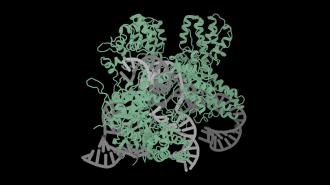Berkeley-based startup Profluent has trained an AI to imagine new, never-before-seen CRISPR proteins — opening the door to gene editors with capabilities beyond what we’ve found in the wild. They’re also making a brand new CRISPR system open source, so any scientist can now start leveraging an AI-designed gene editor to advance their research.
The background: In nature, bacteria evolved CRISPR as a defense against viruses, but in the lab, we can program CRISPR systems to make precise edits to any gene, which has proven to be hugely useful in medicine, agriculture, and more.
Current CRISPR gene editors can make edits in the wrong places or edit too few cells to be effective.
Each CRISPR system has two parts: a strand of RNA that matches the target and a protein that makes the edit. The most commonly used protein for gene editing is called “Cas9,” but scientists have discovered CRISPRs with other proteins that give them unique capabilities — while CRISPR-Cas9 slices through DNA, for example, CRISPR-Cas13 targets RNA.
Our current CRISPR gene editors are far from perfect, though. They can make edits in the wrong places or edit too few cells to make a difference, so researchers are constantly on the hunt for new CRISPR systems.
AI-designed CRISPR: Up until now, that hunt has been limited to the CRISPRs that have been discovered in nature, but Profluent has used the same types of AI models that allow ChatGPT to generate language to develop an AI platform that can generate millions of CRISPR-like proteins.
The same way you might prompt ChatGPT to write an email on a certain topic, researchers can prompt this system to generate proteins for CRISPR gene editors.
“We provide input to our model on the exact attributes and functionalities that are required to solve the problem, and the model will then generate customized and functional sequences that meet our criteria,” Profluent CEO Ali Madani told Freethink.
“[W]e believe we’ve helped to take an important step forward towards a future where AI can be used to design bespoke treatments and cures.”
Ali Madani
Breakthrough: Profluent recently announced that it had successfully used one of its AI-designed CRISPR systems, OpenCRISPR-1, to edit human DNA — achieving what Madani called a “scientific moonshot.”
“[W]e believe we’ve helped to take an important step forward towards a future where AI can be used to design bespoke treatments and cures for patients in need, in a rapid and cost-effective manner,” he told Freethink.
Profluent has launched the OpenCRISPR initiative, making OpenCRISPR-1 freely available to license for ethical research or commercial use (the licensing agreement does prohibit certain applications, such as human germline editing).
“We are rapidly moving away from biology being constrained by what can be discovered in nature, to being able to design precisely according to our needs using AI.”
Ali Madani
According to Madani, Profluent chose to open source a system with this particular AI-designed CRISPR protein because, while it is very different from Cas9, research suggests it has similar efficacy and makes fewer off-target edits, which the startup believes will make it easy for researchers to integrate into their existing workflows.
“Since we have so many generated proteins to choose from, we view OpenCRISPR-1 as just the first step in AI’s impact on gene editors,” said Madani. “We are enthusiastically receptive to feedback on how OpenCRISPR-1 performs in multiple settings in the hands of the broader community.”
Looking ahead: Profluent plans to use the feedback it receives to further optimize OpenCRISPR-1, while also establishing partnerships with research institutions and drug developers interested in creating custom AI-designed CRISPR proteins.
“This is a truly exciting time for the application of AI in the life sciences,” Madani told Freethink. “We are rapidly moving away from biology being constrained by what can be discovered in nature, to being able to design precisely according to our needs using AI.”
“[E]xpect to see future breakthroughs leveraging AI to help develop new treatments for patients in need,” he added.
We’d love to hear from you! If you have a comment about this article or if you have a tip for a future Freethink story, please email us at tips@freethink.com.
